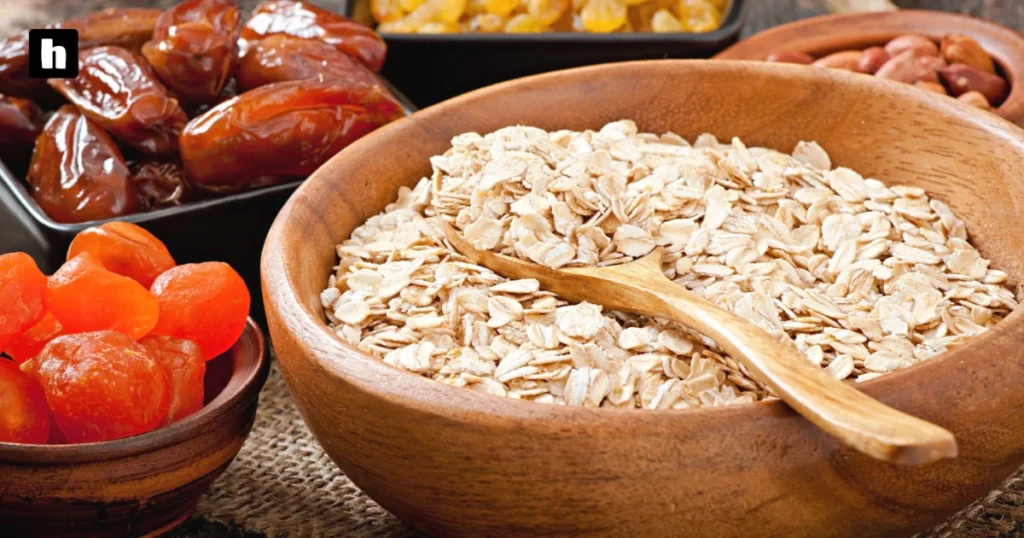
All forms of oats, whether cooked or raw, can be a tasty and convenient way to take advantage of the nutritional benefits of this grain, but improper preparation can also cause discomfort in the digestive tract.
Most people cook their oatmeal and then top it with foods that have sweet toppings. It’s understandable that you would want to know if eating raw oats is safe.
What is raw oats?
Uncooked oats differ from raw oats as they retain the kernels, husks, and stems of the oat plant, having been freshly harvested from the field.
The kernels need to be processed because your body is unable to break them down.,
Oat bran, oat flour, and oat flakes (also referred to as rolled oats) are the end products of the process. Oat flakes, a beloved choice for breakfast, can be consumed either cooked or raw.
This suggests that you can either cook them, as in oatmeal or porridge, or eat them cold, as in shakes made with raw oats.
It is important to note, though, that raw oats can be regarded as cooked because of the heating process that is required to make oat kernels easily digestible.
Is it safe to eat raw oats?
You can eat oats without cooking, yes. For instance, there are many well-liked no-bake cookies that contain oats. But it’s a good idea to gradually add raw oats to your diet and to drink some water while eating the oats because some people have more delicate digestive systems.
What’s the best form of raw oats?
Your preferences and intended use will determine which form of oats is best for you. Nutrient-dense when raw, oat groats require longer cooking times. Ancient or rolled oats cook more quickly and are more adaptable. Perfect for quick meals are quick oats and instant oats. This is a heartier option; steel-cut oats cook more slowly and have a chewier texture. Based on your preferences and available time, make a choice.
Health benefits of eating oatmeal
Improves Heart Health:
Oats are high in fiber and a great source of antioxidants. By scavenging free radicals, these antioxidants enhance cardiac health. As they take up and help lower the cholesterol, oats function as a kind of blotting paper.
A soluble fiber found in oats called beta-glucan lowers blood levels of LDL, or bad cholesterol, and total serum cholesterol by preventing the intestines from absorbing too much cholesterol from the diet. Thus, there is a decreased chance of developing coronary heart disease.
Good for the Skin:
Zinc, which is essential for warding off pimples, is abundant in oats. Oats are a crucial component of acne treatments because they aid in absorbing extra oil from the skin. Due to the skin’s natural ability to retain moisture, they also aid in the treatment of dry and irritated skin.
Additionally, oats help lighten skin tone and are an effective anti-tanning agent.
Good for diabetes patients:
Oats are rich in beta-glycoprotein, which helps in controlling blood sugar levels. This helps in insulin regulation, making it an ideal food for people with type 2 diabetes. By controlling insulin production, oats help in digestion and blood sugar control.
Help weight Loss:
The high fiber content of oats helps them fill you up faster than other breakfast options. In addition, they cause the blood’s glucose levels to drop gradually, which helps people avoid binge eating by keeping them full for longer.
Those who regularly consume oats are less likely to become obese and tend to maintain a stable weight. Furthermore, oats combat belly fat.
Still, since pre-packaged flavor-infused oats are loaded with sugar and can interfere with diets, opt for plain oats instead of those.
Drawbacks of consuming raw oats
While consuming uncooked oats is generally safe, it is advisable to soak them in water, juice, milk, or a nondairy milk substitute to prevent potential adverse effects.
If you consume dry raw oats, they may accumulate in your stomach or intestines, causing indigestion or constipation.
Additionally, raw oats contain phytic acid, an antinutrient that binds to minerals such as iron and zinc, hindering their absorption by your body. This may result in mineral deficiencies over time, although it is typically not a concern if you maintain a balanced diet.
In addition, raw oats soak in water lessens the impact of phytic acids on mineral absorption, so soak oats for a minimum of 12 hours (1, 2, 3).
The bottom line
Oats are a versatile and nutritious grain that can be enjoyed in various forms, both raw and cooked. While raw oats offer health benefits such as improving heart health, aiding in weight management, and being suitable for diabetes control, it’s essential to prepare them properly to avoid digestive discomfort.
Soaking raw oats in liquid can help mitigate the effects of phytic acid and ensure better nutrient absorption. Whether you prefer steel-cut, rolled, or instant oats, incorporating them into your diet in a balanced way can lead to numerous health benefits without the downsides of improper preparation.


